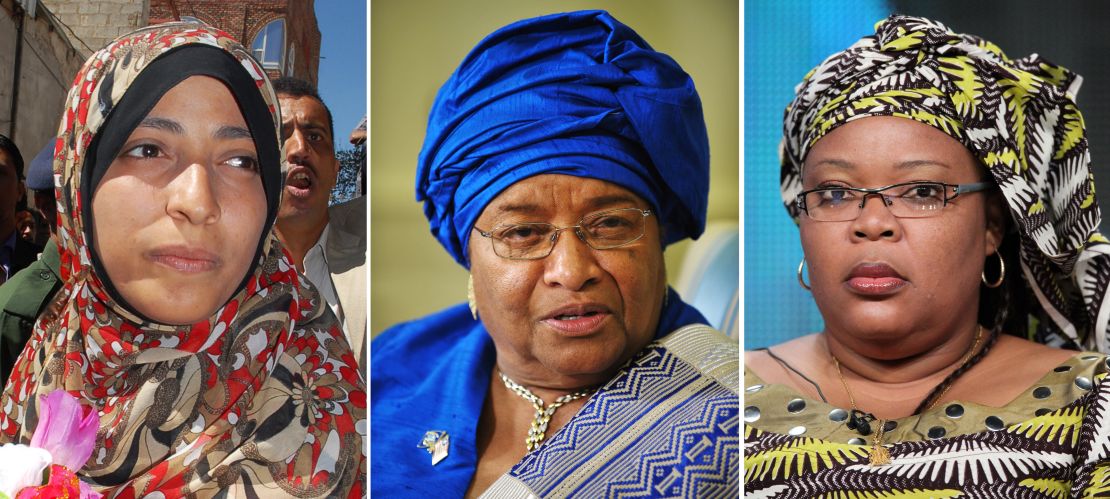Story highlights
1997 Peace Prize winner Jody Williams was thrilled to learn three women had won
Williams heard the news after spending all night working on an issue about women's rights
Williams, who is American, worked on behalf of a campaign that banned land mines
Her advice to the women recognized with Nobel Peace Prize: Stay true to who you are
The morning three women won the Nobel Peace Prize, Jody Williams was tired from a night spent strategizing about how to stop rape and other sexual violence toward women in war.
Williams won the prize in 1997 for her work to ban land mines. Thursday night, she’d joined other female Nobel winners and peace advocates in New York. They belong to a group associated with the Nobel Women¹s Initiative, founded in 2006 by female laureates and activists.
As the news broke Friday about the 2011 winners, Williams was just getting out of bed.
“My husband is already on his computer, and I hear him say, ‘Woah! Three women!’ “
Williams rushed to him and peered at the monitor. She read the names.
Liberian President Ellen Johnson Sirleaf, activist Leymah Gbowee of Liberia and rights activist Tawakkul Karman of Yemen.
On television, a Nobel official explained the decision to award the prize jointly. The women were chosen “for their nonviolent struggle for the safety of women and for women’s rights …

“We cannot achieve democracy and lasting peace in the world unless women obtain the same opportunities as men to influence development of all levels of society,” he said.
Williams was thrilled. She knows Gbowee, she said, and loved that the Nobel Peace Prize was being given to three women, raising the total number of women who have individually won the prize to 15, according to the prize’s official site. Only nine Nobel Peace Laureates are still living, according to the Nobel Women’s Initiative.
“Leymah is incredibly powerful and sure of herself,” Williams told CNN.com. “She has no trouble dealing with the media. I can imagine she is stunned and yet excited and recognizes how much this changes what she does.”
Williams was startled in 1997 when she got the call that she had won.
Looking out her window at 5 a.m. that day in October, she saw reporters camped out on her gravel driveway in Vermont.
Though she knew she was on the Nobel Peace Prize short list, she hadn’t believed she would win. Williams assumed the award would go to more prominent people within the organization where she worked.
As an introvert, she said, she was worried. But she managed to do interview after interview that day. The spotlight hasn’t dimmed as time has passed.
“It was a lot of attention all at once, which was hard for me personally, but it was incredible for the campaign and that was the important thing,” she said.
The International Campaign to Ban Landmines launched in 1992 with six nongovernmental organizations and grew to more than 1,000 NGOs in more than 60 countries.
Within six years, Williams told CNN.com, the campaign succeeded in getting an international treaty banning the weapons. The campaign worked with government, United Nations bodies and the International Committee of the Red Cross. The agreement came during the diplomatic conference in Oslo, Norway, in September 1997.
She was awarded the Nobel a month later.
Williams predicts that the Nobel Prize awarded to two relatively unknown female activists will put more focus on democratic uprisings in the Middle East and North Africa. And it will make Karman a visual representation of the Arab Spring.
“That is going to be totally intense,” Williams said. “But it’s awesome.”
It will be impossible for these Nobel Peace Prize winners and the women they represent to be tamped down or forgotten or told what to do as the movements in their countries unfold and slowly resolve, Williams said.
“You can’t have them go back into the kitchen once they’ve overthrown the dictator,” Williams said.
Giving the Nobel Prize to all the women at once signals a declaration of sorts to the world. It says: We’re not going back. We are stronger in numbers.
Sharing the prize, as two Irish peace activists have in the past, does not diminish the honor, Williams stressed. She has heard criticism to that point and believes it’s important to quash that mentality.
“They were jointly recognized because each of them has done significant work nonviolently to being about democratic change to stop violence against women,” Williams said.
Women tend to work together, she added. It seems fitting that they share the prize.
Williams offered advice to the women who won Friday: Remain true to yourself, she said.
“These women wouldn’t have been recognized if they were not really clear about who they are, what they believe and what they are willing to do to demonstrate their belief through action.”



